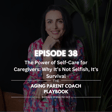
Episode 37: End-of-Life Conversations – How to Approach Them
Talking to your parent about end-of-life wishes is one of the hardest conversations you’ll ever have — but also one of the most important.
Avoiding it doesn’t make the reality go away… it just increases the risk of confusion, conflict, and heartbreak when the time comes.In this episode of The Aging Parent Playbook, Barbara Sparacino, MD walks you through:
• Gentle, non-threatening ways to open the conversation
• Real-life role-play scripts for resistant and receptive parents
• The 4 essential questions to ask so nothing is left unsaid
• Myth-busting common misunderstandings about end-of-life planning
• The three key legal documents every family should have in placeYou’ll leave with practical language, examples, and resources to help you start the conversation — and keep it going — with love, clarity, and respect.Resources mentioned in this episode:
• Free End-of-Life Conversation Checklist
• National Institute on Aging – Advance Care Planning



















